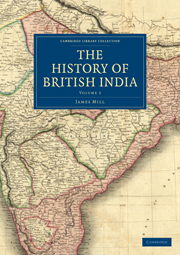Summary
Lord clive, together with Mr. Sumner and Mr. Sykes, who had accompanied him from England, and were two of the persons empowered to from the Select Committee, arrived at Calcutta, on the 3d of May, 1765. The two other persons of whom that extraordinary machine of government was to be composed, were absent; General Carnac, beyond the confines of the province of Bahar, with the army; and Mr. Verelst, at the distant settlement of Chittagong. For as much as the disturbances, which guided the resolves of the Company when they decreed that such a new organ of government should exist, were now removed; and for as much as the Select Committee were empowered to exercise their extraordinary powers for so long a time only as those disturbances should remain; it was a question, whether they were entitled to form themselves into a governing body; but a question of which they speedily disposed. On the 7th of May, exactly four days after their arrival, Lord Clive, and the two gentlemen who accompanied him, assembled; and without waiting for communication with the rest of the destined members declared the Select Committee formed; assumed the whole power of government civil and military; and administered to themselves and their secretaries an oath of secrecy.
The great corruption, which they represented as prevailing in the government, and tainting to a prodigious degree the conduct of the Company's servants, was the foundation on which they placed the necessity for the establishment of the Committee.
- Type
- Chapter
- Information
- The History of British India , pp. 234 - 267Publisher: Cambridge University PressPrint publication year: 2010First published in: 1817



